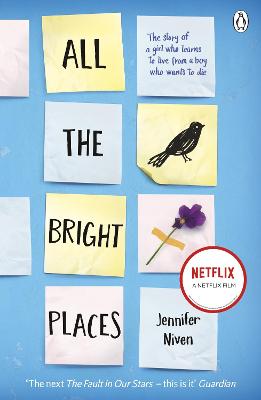Reviewed by abigailjohnson on
The beginning is where I think ATBP suffers the most by the above comparisons. It lacks the captivating dialog that Rowell excels at, and it failed to immediate ingratiate it's protagonists and plight the way Green does. Maybe the later is due to the fact that in FAULT, the characters are suffering from an external plight (cancer), and in ATBP, they are dealing with an internal one (suicidal tendencies). I do think that Niven did a very good job portraying the mindset of a suicidal person in a way that was sympathetic without overly romanticizing death.
Since I started this book with unrealistic expectations, it took me a little bit to let those go and just appreciate the book on it's own merits, once I did that, I started to enjoy ATBP immensely. Finch is, well, he's the star. I fell in love with him and for him and I felt everyone of his emotional peaks and valleys with him. He was like all the best and most tortured YA characters rolled into one. There are things he did in the book that I will always adore him for, and things he did that I'll never forgive him for. He is unforgettable. I enjoyed Violet as well, though I mostly enjoyed her love for Finch (another miss compared to Rowell and Green who have protagonist of equal weight).
Suicide is not something I've had personal experience with (I appreciated reading in the acknowledgment about how deeply personal Niven's experiences were), so I struggled a lot empathizing with the power it held for these characters. It was very frustrating to watch someone so alive almost long to snuff themselves out. Again, I appreciate Niven balancing both sides, expressing deep tragic sadness without mitigating anger and selfishness. There was a tunnel vision displayed by the suicidal characters and a consuming and deadly focus on self. It really was a stark contrast with Green's FAULT characters that I couldn't help dwelling on as I finished this book.
Ultimately, this is not an uplifting book. Back to the two comparison titles, they also dealt with heavy subject matter and deep sadness, but there was something triumphant and bittersweet with how they ended. I can't say the same about ATBP. I didn't sigh with longing or an overload of emotions when I finished this book in the way I had hoped. Again, I loved Finch, and I loved the deft writing that handled such sensitive subject matter, but this left me wanting...more.
Reading updates
- Started reading
- 16 January, 2015: Finished reading
- 16 January, 2015: Reviewed
